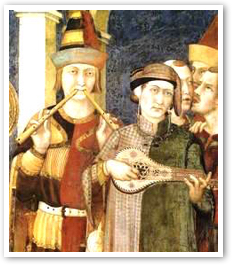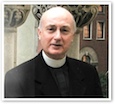Music from the spheres
- FATHER GEORGE W. RUTLER
Among the theories once dismissed as "old wives' tales," was the advice that pregnant women should surround themselves with music.
 Research now shows that this was not a foolish notion at all. Amniotic fluid is a good conductor, and the unborn baby can hear music very well and responds to harmonic and repetitious sounds. As a born person, I betray a prejudice in suggesting that Mozart is probably the best choice and that Rock music unsettles the bodily humors and reason itself.
Research now shows that this was not a foolish notion at all. Amniotic fluid is a good conductor, and the unborn baby can hear music very well and responds to harmonic and repetitious sounds. As a born person, I betray a prejudice in suggesting that Mozart is probably the best choice and that Rock music unsettles the bodily humors and reason itself.
The English composer Sir John Tavener has called Mozart "the most sacred composer of the West," and attributes to him a mystical ability to pluck pre-existing music out of the spheres in an "ecstatic act of being." There are moments — paradoxically, most vivid in pieces not meant to be part of a sacred repertoire — such as Zerlina's aria, "Vedrai carino," in Don Giovanni, in which Mozart conveys "the heartbeat of God seen through the eyes of a child."
That divine heartbeat created our own hearts, and when its purest earthly expression, the Immaculate Heart of Mary, approached her cousin, Elizabeth's baby leapt in the womb at the sound of her greeting. Psychologists claim that a baby can remember music first heard in the womb, months after birth. The first and finest music St. John the Baptist ever heard was Mary's Magnificat, and it may not be fanciful to think that he remembered it when his heart stopped beating at his execution.
Born with congenital glaucoma and blind by the age of twelve, the singer Andrea Bocelli recounts how doctors had advised his mother to "abort the child," because he would be born with a disability. But "the young brave wife decided not to abort, and the child was born ... Maybe I am partisan, but I can say it was the right choice," says Bocelli.
All earthly music is an attempt to "pluck out of the spheres the sound of the Divine Love that said, "Let there be." "Before I formed you in the womb I knew you ..." (Jeremiah 1:5). St. Paul took that music to the nations because he knew that God "from my mother's womb had set me apart" (Galatians: 1:15).
These are not old wives' tales. They are facts, and to deny them is to be unscientific about the soul. What noise there is in our culture is the denial of God's appealing voice. That is why those who would interrupt that voice become aggressive and anxious and cut off reasonable discussion of the sanctity of life. The Immaculate Mother had the world's most perfect pitch, having been conceived free of the original noise of pride. The world today would be worse than noisy; it would not even know the difference between noise and harmony, if Mary had said "no" to the angel instead of "yes."
 This is Meaghen Gonzalez, Editor of CERC. I hope you appreciated this piece. We curate these articles especially for believers like you.
This is Meaghen Gonzalez, Editor of CERC. I hope you appreciated this piece. We curate these articles especially for believers like you.
Please show your appreciation by making a $3 donation. CERC is entirely reader supported.

Acknowledgement
 Father George William Rutler. "Music from the spheres." From the Pastor (July 11, 2010).
Father George William Rutler. "Music from the spheres." From the Pastor (July 11, 2010).
Reprinted with permission of Father George W. Rutler.
The Author
 Father George W. Rutler is the pastor of St. Michael's church in New York City. He has written many books, including: The Wit and Wisdom of Father George Rutler, The Stories of Hymns, Hints of Heaven: The Parables of Christ and What They Mean for You, Principalities and Powers: Spiritual Combat 1942-1943, Cloud of Witnesses — Dead People I Knew When They Were Alive, Coincidentally: Unserious Reflections on Trivial Connections, A Crisis of Saints: Essays on People and Principles, Brightest and Best, and Adam Danced: The Cross and the Seven Deadly Sins.
Father George W. Rutler is the pastor of St. Michael's church in New York City. He has written many books, including: The Wit and Wisdom of Father George Rutler, The Stories of Hymns, Hints of Heaven: The Parables of Christ and What They Mean for You, Principalities and Powers: Spiritual Combat 1942-1943, Cloud of Witnesses — Dead People I Knew When They Were Alive, Coincidentally: Unserious Reflections on Trivial Connections, A Crisis of Saints: Essays on People and Principles, Brightest and Best, and Adam Danced: The Cross and the Seven Deadly Sins.




